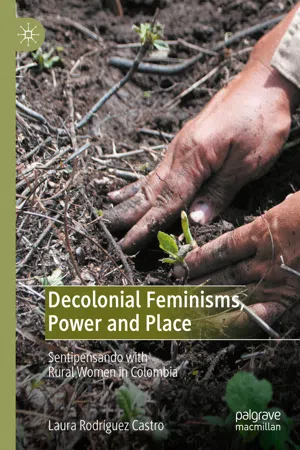1.1 Introduction
It is difficult to explain this to a white woman when the conditions for dialogue are not given; look, we do not agree with the imposition of hegemonic feminist criteria, but I recognise and value all of the learning that I have acquired from all the different feminist currents because they have provoked me to recognise myself as an epistemic subject and therefore to think myself from the body and the space where I live to weave my feminist ideas. With that I strengthen the conscious construction of my feminist communitarian identity and at the same time we contribute to the feminist movement of the world. Among other things, the step we need to take is to name our own liberated languages and cosmovisions and the categories and concepts that we are constructing for the analysis of our historical realities of oppression, but also of liberation as native Indigenous, campesinas, rural or of territories.
Lorena Cabnal—communitarian feminist Maya-Xinka (cited in Gargallo Celentani 2014, 17).1
The embodied and spatial struggle that Lorena Cabnal talks about in the opening quotation is one that I have experienced during my ongoing journey towards engaging with decolonial and feminist insurgencies. However, in contrast to Lorena Cabnal, my own biography and positionality are deeply implicated in the ‘hegemonic feminist criteria’, which shaped my upbringing and education. Growing up in the 1990s in Bogotá, Colombia, in an upper middle-class family, I was very influenced by my mother’s ideas of feminism and social justice . At the time, my brother and I lived with her and only saw my father on weekends. My first memories of my mother undertaking paid work were visits to her at a non-governmental organisation (NGO) focusing on women’s reproductive rights—which were still highly taboo in our country. My mother, who was the Executive Director of the organisation, wrote a psychological thesis on abortion in a time when these debates were scarce in the country. Thus, I was raised as a feminist, and for that I will always be grateful to my mother. However, my first encounters with feminist ideas were historically placed in the experiences and privileges of white-mestiza women in Colombia, who, like many ‘second-wave feminists’, were primarily concerned with the struggle for reproductive rights. As I started to engage with decolonial, anti-racism and diverse struggles of women’s insurgencies, I started to reflect deeply on the issues of racism and ethnocentrism, which were marginalised in much of the feminisms I had encountered in the past.
Like Cabnal, I am thankful for the different currents of feminism that have awakened me to think of myself as an epistemic subject, and that motivated the work presented in this book. There is thus a paradox in my relationship with feminism. The fact that, in both my higher education in sociology in an Australian university and feminist upbringing, I was not directly exposed to decolonial thought is symptomatic of a racist and colonial gaze that remains present in various forms of feminism. As a migrant student based in an Australian university, I spent time contemplating the power relationships and inequalities between what we know today as the Global North and the Global South That is, the Global South understood beyond delineated geographical borders and fixed definitions of nation-states and conceptualised as those places that have been particularly affected by global capitalism (see De Sousa Santos 2014). Then, in 2013, as I embarked on a journey to get to know the Campesina women of my country, sharing with them political spaces and living in their territories, the ideas of liberation I had forged in the process of identifying as a feminist were destabilised.
As I spent time with the Colombian Campesinas and listened to rural women’s accounts of resistance and re-existence2 through their own cosmovisions, I came to question my own understanding of feminism, and its relationship to colonial power. In the process, I questioned my positionality and the privilege that came with it, and started a journey towards unlearning to feeling-know. As part of this journey, I endeavoured to promote and create the spaces for the types of dialogue that Lorena Cabnal refers to and found sentipensar . Thus, sentipensar became central to my decolonial praxis, destabilising my truths and posing important epistemic questions. I present it here not as a framework to follow, but as a conscious decision to make my presence visible in this body of work. I return to these reflections in Chap. 3 (see also Rodriguez Castro 2017, 2018, 2020).
This book aims to support the progressive politics and actions around the world that are dismantling the Colonial Matrix of Power (CMP) and the coloniality of gender, while enacting the re-existence of other worlds. I imagine and narrate the enacting of other worlds based on the local herstories, stories, testimonies and narratives of insurgency of rural women in Colombia. The book is embedded in three interconnected projects. The first is the dismantling of some of the actions of colonial feminisms which are examined in this chapter by looking at their historical development and their connections with the coloniality of power and gender. Arguably, colonial feminisms are embedded within the CMP and have contributed to the marginalisation of the majority of women’s voices and experiences. In response, I engage with decolonial feminisms,3 not as a concrete theory, but as a process that is alive, emphasising the openness of identities and the entanglement of ways of thinking (Méndez Torres et al. 2013). I particularly focus on the intellectual and activist struggles of descolonial feminism...
